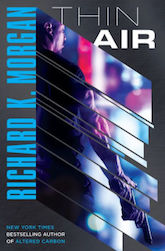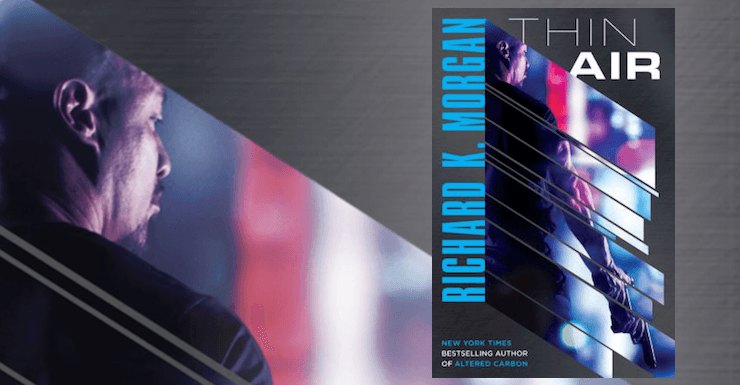Exciting news: Richard K. Morgan is writing science fiction again! Morgan burst onto the scene about fifteen years ago with a handful of dark, gritty SF novels. His debut Altered Carbon won a well-deserved Philip K. Dick Award and has since been adapted as a TV series on Netflix. It was followed by two more novels focused on protagonist Takeshi Kovacs, as well as the standalones Market Forces and Black Man (alternatively titled Thirteen or Th1rt3en in the United States), all published in a five year period.
Then, Morgan’s career took a surprising turn towards fantasy, albeit fantasy that was just as dark and gritty as the author’s prior SF output. The trilogy A Land Fit for Heroes is a stunning achievement (and very high on my personal to-be-reread-if-I-ever-find-the-time list) but its popularity may have suffered a bit because of 1) the overwhelming amount of dark, gritty fantasy crowding the shelves in those years and 2) the three year gap before the release of the second installment, followed by another three year gap before we got the third one.
And now, eleven years after the release of his last science fiction novel, Richard K. Morgan returns to the genre in grand form with Thin Air, a (yes, dark and gritty) novel set in the same universe as Black Man/Thirteen. (More about this shared universe later!)
If I have one criticism of Morgan’s writing, it’s the striking similarity of the main characters in his SF novels: hard, hyper-cynical men with dark pasts and a notable facility with extreme violence. You can draw a line straight from Takeshi Kovacs through Carl Marsalis to Thin Air’s Hakan Veil, a self-described “has-been ex-corporate enforcer.” The “ex” part of that description is problematic, as Veil was, quite literally, born to do this job. Like Marsalis in Black Man/Thirteen, he was genetically modified and trained from birth for a specific purpose, but unlike Marsalis, Veil is a hibernoid, meaning he is in a comatose hibernation state for four months out of every twelve and awake for eight. This makes him particularly suitable to become an “overrider”: a cryogenically frozen enforcer who can be thawed out remotely when trouble occurs on long-haul interplanetary journeys.
Overriders go through a “running-hot” period right after waking: obsessive focus, increased aggression, almost superhuman reflexes. This is helpful because their main purpose is doing things like putting down violent mutinies. (As the overrider manual dryly notes, the context they find themselves in when waking up is “likely going, or has already gone, completely to shit.”) No longer an overrider, Veil has been stuck on Mars for fourteen years after a failed mission got him fired. He now scrapes by as muscle-for-hire for the Martian criminal underground.
When Thin Air gets started, Veil has a run-in with Martian law enforcement in the person of MPD Homicide detective Nikki Chakana—easily my favorite character in a novel filled with memorable ones. This run-in eventually results in him being assigned protection duties for Madison Madekwe, one of a large team of auditors that has recently arrived from Earth to investigate fraud and corruption on Mars.
Veil and Madekwe visit several expertly drawn locations on Mars to discover what happened to a recent winner of the Mars lottery who has mysteriously disappeared. The prize for the lottery is not, as you might expect, money, but instead a free trip back to Earth. After all, Richard K. Morgan’s Mars is a combination of Wild West free-for-all, penal colony, and corporate dystopia. The “High Frontier” can-do pioneer spirit advertised in the brochures to lure new colonists is treated as a cynical running joke throughout the book, and there’s a lucrative “Indenture Compliance” industry for hunting down people who have violated their contracts by abandoning their jobs or sometimes simply losing their minds and wandering off.
Dark as it is, world building is one of Thin Air’s strongest points. It may be a cliché, but Morgan really makes this version of Mars come to life. Various neighborhoods and areas are described in a way that makes you feel like you’ve actually been there. Details about past events and bits of Martian history are skillfully dropped throughout the story, and various factions, from crime syndicates to rich Earth-born “ultratrippers” to a radical “Mars First” group, make the place feel as realistic and vibrant as anything I’ve read in the genre. Of course it doesn’t hurt that Morgan is building on a setting he introduced in a previous novel.
Full disclosure: when I picked up Thin Air, I was completely unaware that it’s set in the same universe as Black Man/Thirteen. Because it’s been eleven years and my memory sucks, I decided to squeeze in a quick reread of the earlier novel. Having now read both books back to back, I’m happy to say that you don’t really need any familiarity with Black Man/Thirteen to enjoy Thin Air. Even though the novels are clearly set in the same universe, they’re also set on different planets (Earth vs. Mars) and, more importantly, at least a century apart, so you can make perfect sense of Thin Air without having read the previous novel.
Buy the Book


Thin Air
That being said, Morgan is still not big on infodumps and instead lets the reader figure out the details of this complex, dystopic future by gradually piecing together hints from his characters’ interior monologues. These are the type of books where you have to be comfortable with not understanding some of the jargon for a while and trust Morgan to eventually explain it. That learning curve will be somewhat gentler for folks who have read Black Man/Thirteen, so it helps to be familiar with the earlier novel, but it’s not in any way required to enjoy the new one. (It would be actually interesting to compare and contrast the two novels, because there are some striking parallels between them, but that would lead us far into spoiler territory. Maybe something for an eventual re-read…)
Returning fans of Richard K. Morgan will immediately recognize the author’s high octane writing style. Back when Altered Carbon was released, Morgan’s moody future-noir atmosphere and ultra-vivid imagery reminded me of Sprawl-trilogy-era William Gibson (except considerably darker and more violent), but fifteen years later I don’t think that comparison is entirely valid. In a nutshell, what you’re reading is the interior monologue of a classic Morgan anti-hero in all its darkly cynical glory, interspersed with snappy and often snarky dialogue, spectacularly violent action sequences, and the occasional graphic sex scene. There are a few parts that drag, especially towards the end, but the vast majority of the novel is fast-paced and hard to put down. For such a dark novel, it’s also surprisingly funny at times, with a few hilarious scenes and some phrases only Morgan could come up with. (Veil’s hacker friend—an unforgettable character all by himself—describes two people who keep popping up in the same place during his research as “stuck together in the data like tissues on a lap dance cabin floor.”)
Now Richard K Morgan has returned to the universe of Black Man/Thirteen, I hope he’ll stick around and turn these two novels into a trilogy at some point. There’s lots of room to explore in this universe, both literally (more planets have been colonized in the years between the two novels) and otherwise. I’d love a story with a bonobo (the third genetic variant frequently mentioned in the books) as a main character, but that’s probably unrealistic. Whatever happens, Thin Air is a worthy addition to Richard K. Morgan’s increasingly impressive bibliography. Recommended.
Thin Air is available from Del Rey.
Stefan Raets reads and reviews science fiction and fantasy whenever he isn’t distracted by less important things like eating and sleeping. His (sadly neglected) website is Far Beyond Reality.










